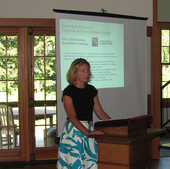Highlight
Energy Demand & Climate Change
Achievement/Results
NSF-funded graduate student Abigail Anthony, a Ph.D. candidate in the University of Rhode Island Department of Environmental and Natural Resource Economics, has developed a model to forecast the impact of climate change on residential electricity demand for air conditioning. Anthony is a trainee in the URI Coastal Institute IGERT Project. Ms. Anthony’s research illustrates how peak demand reduction strategies can reduce future energy costs and greenhouse gas emissions from electricity generation; a topic of particular importance in the face of climate change. Hotter temperatures and extended heat waves will lead to more frequent and less predictable peaks. Many systems are already beginning to feel the strain of rising temperatures, causing policy makers at all levels of government to start examining management decisions aimed at reducing peak electricity demand and improving the resiliency of the grid.
Weather is the key driver of peak electricity demand. One of the problems with forecasting electricity demand is that future temperatures are likely to be outside the boundaries of historical experience. That is, regions of the U.S. are very likely to experience extremely hot days and extended heat waves in magnitudes and frequencies that have never been seen before. This makes forecasting electricity demand more challenging because the behavior of the variables might be different under these extreme conditions compared to what we have seen historically. Anthony is addressing these challenges by developing a weather-based regression model to forecast residential electricity demand for air conditioning for the Stockton, California region. Using residential electricity demand data and California climate projections developed for the California Energy Commission and Environmental Protection Agency, Anthony has developed a method for forecasting daily electricity demand and associated confidence intervals. Anthony applied this model to climatic projections based on high and low levels of future greenhouse gas emissions to develop alternative scenarios of peak residential electricity demand for air conditioning for the Stockton area in each year from 2010 to 2100. Furthermore, she estimates the peak demand reductions (and associated cost savings and greenhouse gas reductions) that could be realized if “smart” thermostats are used to control the amount of electricity consumed by customers’ air conditioners during critical hours.
Anthony’s research grew out of her IGERT-funded internship with the New England Clean Energy Council (NECEC). The Council represents a diverse set of stakeholders, including clean energy companies, venture investors, major financial institutions, local universities, industry associations, electric utilities, and large commercial end-users. Anthony’s role at the Council was to develop written materials that were used to educate the stakeholders about new technologies, strategies, or policies that are shaping the way the region uses energy. Through this process, Anthony was introduced to the issue of peak demand and identified the challenges that climate change present to forecasting future energy use. Anthony reports: “Not only did my IGERT-internship inspire my research, but the internship also gave me the opportunity to develop a broad network of energy experts that have proven to be invaluable in providing help and guidance in my dissertation research.”
One of the many relationships that Anthony fostered during her IGERT-internship was with New England-based ENE (Environment Northeast). ENE is a non-profit organization that researches and advocates innovative policies that tackle our energy and climate challenges while promoting sustainable economies. Recognizing the value in Anthony’s research, ENE granted her the Energy Policy Research Fellowship. As a graduate fellow for ENE, Anthony provides research that informs the development of state and regional energy policy. Currently, Anthony is working with a collaboration between ENE and Northeast Utilities to install public charging stations for electric vehicles in Connecticut and Massachusetts, and collect data on drivers’ charging behavior in order to determine the impact of electric vehicles on grid stability, petroleum consumption, and greenhouse gas emissions. “My IGERT training prepared me well for my work at ENE. IGERT taught me the necessity of maintaining scientific integrity in policy and the delicate practice of working with stakeholders. Both of these lessons are crucial when navigating the policy-making process,” reports Anthony.
Anthony’s internship was supported by an NSF IGERT grant to the University of Rhode Island Coastal Institute. Her research efforts have also received generous support and guidance from the URI Partnership for Energy, ENE, the California Climate Change Center at Scripps Institute of Oceanography, and KEMA, Inc. Anthony’s research is a model of how the IGERT experience can result in true multidisciplinary Ph.D. research. Furthermore, it demonstrates how the IGERT initiative can be leveraged with other opportunities to extend the research beyond the university to the policy arena.
Address Goals
DISCOVERY: IGERT trainee Anthony’s research is truly multidisciplinary and integrates climatology, economics, human behavior, and energy policy. The training she received in the CIIP has prepared her to move with ease among these fields to create a Ph.D. dissertation research project that is timely, critically important to society, and transcends disciplinary boundaries.
LEARNING: Ms. Anthony’s IGERT training experience, in tandem with her graduate program in environmental and natural resource economics has proven to be an effective pedagogy. She is using contemporary tools in statistical model development and energy economics in conjunction with the communication, leadership, and negotiation skills she was taught in the CIIP. The result is our Highlight story: a gifted student, an important research question, and the discovery of a science-based research result that has direct value to society.







